11 July 2021_NAIDOC Week 2021_Sunday Worship Service_Kevin Lee
10 Jul 2021 by Seungjae Yeon in: Worship Online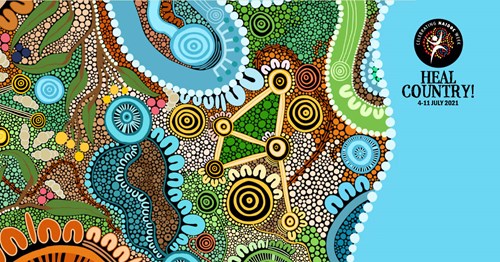
Sunday Worship Service
Pentecost 7
NAIDOC Week 2021
Leader: Kevin Lee
Welcome and Call To Worship
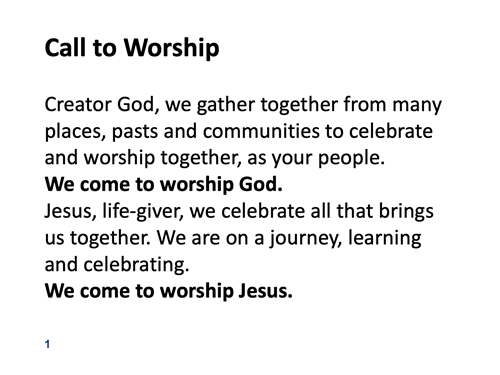
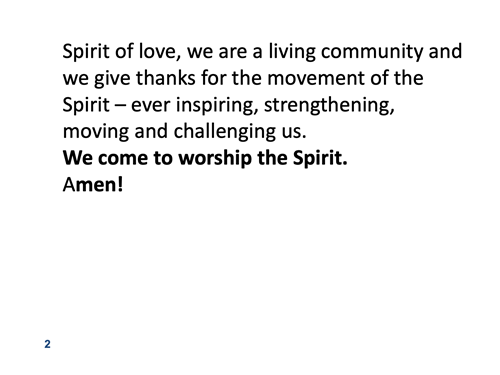
Prayer of Adoration and Confession
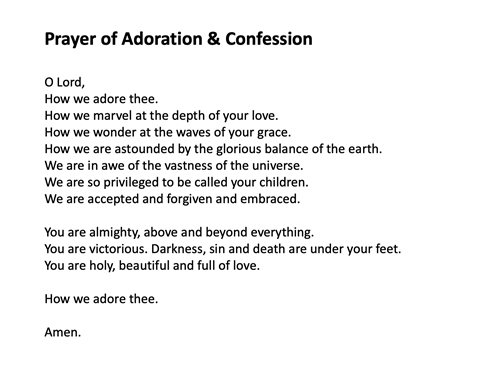
Hymn Singing
Morning Has Broken
Children's Story
Kevin Lee
Hymn Singing
The Love of God
Bible Readings
Gabby Su Young Lee
Ephesians 1:3-14
Praise for Spiritual Blessings in Christ
3 Praise be to the God and Father of our Lord Jesus Christ, who has blessed us in the heavenly realms with every spiritual blessing in Christ. 4 For he chose us in him before the creation of the world to be holy and blameless in his sight. In love 5 he predestined us for adoption to sonship through Jesus Christ, in accordance with his pleasure and will— 6 to the praise of his glorious grace, which he has freely given us in the One he loves. 7 In him we have redemptionthrough his blood, the forgiveness of sins, in accordance with the richesof God’s grace8 that he lavished on us. With all wisdom and understanding,9 he made known to us the mystery of his will according to his good pleasure, which he purposed in Christ, 10 to be put into effect when the times reach their fulfillment—to bring unity to all things in heaven and on earth under Christ.
11 In him we were also chosen, having been predestined according to the plan of him who works out everything in conformity with the purpose of his will, 12 in order that we, who were the first to put our hope in Christ, might be for the praise of his glory.13 And you also were included in Christ when you heard the message of truth, the gospel of your salvation. When you believed, you were marked in him with a seal,the promised Holy Spirit,14 who is a deposit guaranteeing our inheritanceuntil the redemption of those who are God’s possession—to the praise of his glory.
基督裏的屬靈福氣
3 願頌讚歸給我們主耶穌基督的父 神。他在基督裏曾把天上各樣屬靈的福氣賜給我們。 4 因為他從創世以前,在基督裏揀選了我們,使我們在他面前成為聖潔,沒有瑕疵,滿有愛心。 5 他按着自己旨意所喜悅的,預定我們藉着耶穌基督得兒子的名分, 6 使他榮耀的恩典得到稱讚;這恩典是他在愛子裏白白賜給我們的。 7 我們藉着這愛子的血得蒙救贖,過犯得以赦免,這是照他豐富的恩典, 8 充充足足地賞給我們的。他以諸般的智慧聰明, 9 照自己在基督裏所立定的美意,使我們知道他旨意的奧祕, 10 要照着所安排的,在時機成熟的時候,使天上、地上、一切所有的,都在基督裏面同歸於一。 11 我們也在他裏面得了基業;這原是那位隨己意行萬事的 神照着自己的旨意所預定的, 12 為要使我們,這些首先把希望寄託在基督裏的人,頌讚他的榮耀。 13 在基督裏你們聽見真理的道,就是那使你們得救的福音,你們也信了他,就受了所應許的聖靈為印記。 14 這聖靈是我們得基業的憑據,直等到 神的子民得救贖,使他的榮耀得到稱讚。
그리스도 안에서 누리는 영적인 복
3 우리 주 예수 그리스도의 아버지 하나님께 찬양을 드립니다. 하나님 아버지께서는 그리스도 안에서 하늘의 모든 영적인 복을 우리에게 내려 주셨습니다.
4 하나님은 우리가 자기 앞에서 거룩하고 흠이 없게 하시려고 세상을 창조하시기 전에 그리스도 안에서 우리를 선택하셨습니다. 그리고 우리를 사랑하셨기 때문에
5 하나님은 예수 그리스도를 통하여 그분의 기뻐하시는 뜻을 따라 우리를 자기 자녀로 예정하셨습니다.
6 이것은 우리가 그분이 사랑하시는 아들 안에서 우리에게 거저 주신 은혜와 영광을 찬양하게 하려는 것입니다.
7 우리는 하나님의 풍성하신 은혜를 따라 그리스도 안에서 그분의 피로 죄 사함을 받고 구원을 얻었습니다.
8 하나님은 모든 지혜와 총명으로 우리에게 그런 은혜를 주신 것입니다.
9 그리고 하나님은 자기가 기뻐하시는 뜻대로 그리스도 안에서 미리 계획하신 비밀을 우리에게 알려 주셨는데
10 그것은 때가 되면 하늘과 땅에 있는 모든 것이 그리스도 안에서 하나가 되도록 하는 것입니다.
11 그리스도 안에서 모든 것을 자기 뜻대로 이루시는 하나님의 계획을 따라 예정대로 우리는 그분의 [a]백성이 되었습니다.
12 이것은 제일 먼저 그리스도를 대망하던 우리가 하나님의 영광을 찬양하도록 하기 위한 것입니다.
13 그리고 여러분도 진리의 말씀인 구원의 기쁜 소식을 듣고 그리스도를 믿게 되었으며 하나님께서는 이를 확인하는 표로 약속하신 성령을 우리에게 주셨습니다.
14 성령께서는 하나님이 약속하신 것을 우리가 받을 것이라는 것을 보증하시고 하나님의 백성이 구원을 받아 그분의 영광을 찬양하도록 하십니다.
John the Baptist Beheaded
14 King Herod heard about this, for Jesus’ name had become well known. Some were saying, “John the Baptist has been raised from the dead, and that is why miraculous powers are at work in him.”
15 Others said, “He is Elijah.”
And still others claimed, “He is a prophet, like one of the prophets of long ago.”
16 But when Herod heard this, he said, “John, whom I beheaded, has been raised from the dead!”
17 For Herod himself had given orders to have John arrested, and he had him bound and put in prison. He did this because of Herodias, his brother Philip’s wife, whom he had married.18 For John had been saying to Herod, “It is not lawful for you to have your brother’s wife.” 19 So Herodias nursed a grudge against John and wanted to kill him. But she was not able to,20 because Herod feared John and protected him, knowing him to be a righteous and holy man.When Herod heard John, he was greatly puzzled; yet he liked to listen to him.
21 Finally the opportune time came. On his birthday Herod gave a banquet for his high officials and military commanders and the leading men of Galilee.22 When the daughter of Herodias came in and danced, she pleased Herod and his dinner guests.
The king said to the girl, “Ask me for anything you want, and I’ll give it to you.” 23 And he promised her with an oath, “Whatever you ask I will give you, up to half my kingdom.”
24 She went out and said to her mother, “What shall I ask for?”
“The head of John the Baptist,” she answered.
25 At once the girl hurried in to the king with the request: “I want you to give me right now the head of John the Baptist on a platter.”
26 The king was greatly distressed, but because of his oaths and his dinner guests, he did not want to refuse her.27 So he immediately sent an executioner with orders to bring John’s head. The man went, beheaded John in the prison,28 and brought back his head on a platter. He presented it to the girl, and she gave it to her mother.29 On hearing of this, John’s disciples came and took his body and laid it in a tomb.
施洗約翰之死
14 耶穌的名聲傳開了,希律王也聽見。有人說:「施洗的約翰從死人中復活了,因此才有這些異能在他裏面運行。」 15 但別人說:「他是以利亞。」又有人說:「是先知,正如先知中的一位。」 16 希律聽見卻說:「是我所斬的約翰,他復活了。」 17 原來,希律為他兄弟腓力的妻子希羅底的緣故,派人去抓了約翰,把他綁了在監獄裏,因為希律已經娶了那婦人。 18 約翰曾對希律說:「你佔有你兄弟的妻子是不合法的。」 19 於是希羅底懷恨他,想要殺他,只是不能。 20 因為希律怕約翰,知道他是義人,是聖人,所以就保護他,雖然聽了他的講論十分困惑,仍然樂意聽他。 21 有一天,恰巧是希律的生日,希律擺設宴席,請了大臣、千夫長和加利利的領袖。 22 他的女兒希羅底進來跳舞,使希律和同席的人都很高興。王就對女孩說:「無論你要甚麼,向我求,我都會給你」; 23 又對她多次起誓說:「無論你向我求甚麼,就是我國家的一半,我也會給你。」 24 她就出去對她母親說:「我該求甚麼呢?」她母親說:「施洗約翰的頭。」 25 她就急忙進去見王,求他說:「我願王立刻把施洗約翰的頭放在盤子裏給我。」 26 王就很憂愁,然而因他所發的誓,又因同席的人,不願食言, 27 就立刻派一個衛兵,吩咐拿約翰的頭來。衛兵就去,在監獄裏斬了約翰, 28 把頭放在盤子裏,拿來給那女孩,她就給她母親。 29 約翰的門徒聽到了,就來把他的屍體領去,放在墳墓裏。
요한의 죽음
14 예수님의 소문이 널리 퍼져 마침내 헤롯왕의 귀에까지 들어갔다. 사람들은 “죽은 세례 요한이 다시 살아났다! 그래서 그가 기적을 행하는 이런 능력을 소유하게 되었다” 하고 말하였다.
15 어떤 사람은 그를 엘리야라고 말하고 또 어떤 사람은 옛날의 예언자와 같은 분이라고 하였으나
16 헤롯은 듣고 “내가 목 베어 죽인 요한이 다시 살아났다” 하였다.
17 헤롯은 전에 자기 동생 빌립의 아내 헤로디아와 결혼한 일로 요한을 잡아 가둔 일이 있었다.
18 그것은 요한이 헤롯에게 “동생의 아내와 결혼한 것은 잘못입니다” 하고 말했기 때문이었다.
19-20 그래서 헤로디아는 요한에게 앙심을 품고 그를 죽이려 하였으나 헤롯이 요한을 의롭고 거룩한 사람으로 여겨 두려워하며 보호하기 때문에 뜻을 이루지 못하였다. 헤롯은 요한의 말을 들을 때 몹시 괴로워하면서도 그의 말을 즐겨 듣곤 하였다.
21 마침 헤로디아에게 좋은 기회가 왔다. 헤롯이 자기 생일에 고관들과 고위 군 지휘관들과 갈릴리의 귀빈들을 초대하여 잔치를 베풀었다.
22 그 자리에 헤로디아의 딸이 들어와 춤을 춰서 헤롯과 참석한 손님들을 즐겁게 하자 왕은 소녀에게 “네 소원이 무엇인지 말해 보아라.
23 내 나라의 절반이라도 주겠다” 하고 약속하였다.
24 소녀가 나가서 자기 어머니에게 “무엇을 요구할까요?” 하고 묻자 그녀는 “세례 요한의 머리를 달라고 하여라” 하고 대답하였다.
25 그래서 소녀는 급히 왕에게 가서 “세례 요한의 머리를 쟁반에 담아 지금 곧 제게 주십시오” 하였다.
26 왕은 몹시 괴로워하면서도 자기가 한 약속과 잔치 자리에 앉아 있는 손님들 때문에 소녀의 요구를 거절하고 싶지 않았다.
27 왕이 즉시 사형 집행인을 보내며 요한의 목을 베어 오라고 명령하자 그는 감옥에 가서 요한의 목을 베어
28 그 머리를 쟁반에 담아다가 소녀에게 주었으며 소녀는 그것을 자기 어머니에게 갖다 주었다.
29 요한의 제자들은 이 소식을 듣고 시체를 가져다가 장사하였다.
This is the Word of the Lord.
Thanks be to God.
Hymn Singing
Amazing Grace
Sermon Kevin Lee
Hello everyone and hello church! Today is the last day of NAIDOC week which dated 4-11 July 2021. NAIDOC stands for (National Aborigines and Islanders Day Observance Committee) and is an event which celebrates the history, culture and achievements of First Nations people. So today, I thought I’d share a slightly different viewpoint for my sermon.
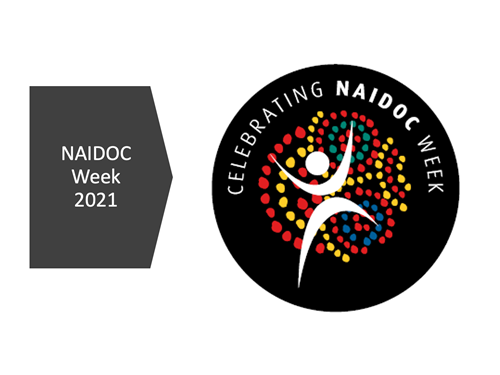
Next year marks the 50th anniversary of my family’s arrival to Australia from Malaysia and I have pretty much grown up in Australia (with the exception of the first 5 years of my life) and I can vouch that this is a special, beautiful and wonderful country to live. So since 1972, I have lived in Sydney having lived in suburbs like Eastlakes, Lane Cove and finally settling in Ryde when my parents bought a house down near Putney. However, it wasn’t till 1983 (Year 10) that I first met or spoke to a First Nations person. It was at a rugby league match between Balmain and another team back on Thursday nights (they used to play the AMCO Cup at Leichhardt Oval) and Balmain had a fast left side winger called Larry Corowa who scored many tries down on the wing as I witnessed during a match. After the game, he met up with kids along the fence line including me and I got to shake his hand.
Growing up in Australia, I had very little knowledge of Aboriginal people of Australia or their culture or history. Libraries back in the late 1970s and early 80’s were very much on European experiences in Australia since 1770 or 1788 and only small experiences on TV showed much on aboriginal lives when I was in high school. I recall seeing Storm Boy with a young David Gulpilil and the odd appearance of an aboriginal face on Skippy (TV series back in the 1970s).
But that all changed with pop culture in the early to mid-eighties where I started being influenced by music and its global outreach (all before the internet). I am happy to admit that I learned much on indigenous history and culture from music and bands and artists like Midnight Oil, Goanna and Paul Kelly including all the worst of times such as the Stolen Generation, the massacres, terra nullius, mission camps, the abuse in indigenous society, problems with alcohol, worrying crime and health in indigenous society …. etc. In particular, I followed Midnight Oil whom I have had a lifelong following (over 35 years) when they were just a local Sydney band playing surfing songs and rock & roll songs and their change to a First Nations advocate after their 1986 tour to Central Australia. How did a bunch of very academic law, arts and architecture undergraduate students turn out to be a political musical force worldwide?? Whether it was writing songs about the huge amount of nuclear arms, about corporate injustice and corporate power over good or fighting for the victims of the asbestos industry, Midnight Oil became my social justice heroes.
Music transcends borders and within 1986-1992, I had started learning much of the First Nations people and their exile from society. I learnt about Albert Namitjira (his paintings) and his granting of Australian citizenship in 1957 even though citizenship would only follow through for First Nations people in 1967. I also learnt about the plight about the Tasmanian aborigines and their demise.
But when I started university at the University of Sydney, the campus environment really opened my eyes. Political activism was just another accepted mantra at university. As a first year student in 1986 in Uni, the Labor and Liberal Parties were scouting for recruits, same with the Communist Party of Australia and every other alternate political party. Although I studied engineering, I joined a bushwalking group and continued my love of the bush where I could see the past legacy of the First peoples through middens, cave paintings and other art works such as rock engravings.
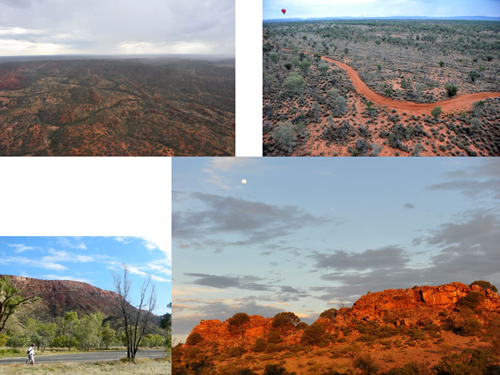
It was at Uni where I probably only started reading the newspaper regularly when I was in my early twenties. What my father read everyday on the living room table was only a back page (sport) glance for me for a very long time. But in my early twenties I started reading the newspaper headlines and started to slowly understand the politics of the day and in Australia which included my very bias father who was a pro-Labor voter.
Looking back today, there have been many First Nations people who have been heroes, some very famous like Cathy Freeman, Evonne Goolagong who have made it internationally in times gone past and those today like Ash Barty and Patty Mills in the NBA. Others like Eddie Mabo, Neville Bonner and Charles Perkins have made much of their lives in the political arena for the better of their people. Even my favourite NRL Club the Rabbitohs based in Redfern has 7 of its top 17 players in the squad as indigenous players. But I believe that it was my first visit to the Northern Territory in the late nineties that made me see a new Australia one that was centred in an ancient culture and told of land management and caring for the environment. This visit was followed up with a trip to the Top End with my father and mother in 2003 when my father was terminally ill to visit some very notable locations like Kakadu National Park which I can honestly say is breathtaking. I also fortunately had a further opportunity doing some corporate community work in Alice Springs in 2010 which further made me appreciate indigenous people, their culture, their problems but also their resilience.
I have two personal First Nation heroes. One in Charles Perkins and the other Gurrumul Yunupingu.
Charles Perkins was the first Aboriginal Australian to graduate from university at Sydney University in 1966 and dedicated his life in improving the civil rights for aboriginal and Torres Strait Island people. He was famous for organising his Freedom Ride in 1965 as a student to show the public the discrimination that Aboriginal people had to endure especially in regional NSW (Moree, Walgett) where aboriginal people were barred from RSL’s (even those who fought in both World Wars) and barred from public swimming pools. He was a fearless man and spoke his mind when it came to representing indigenous people. His work brought enough publicity and awareness that helped in the YES vote in the 1967 referendum for amendments to the constitution to allow inclusion of Aboriginal people in censuses (also in voting rights). Charles spent his senior public life as Permanent Secretary in the Department of Aboriginal Affairs and later as Deputy Chair of ATSIC. Charles Perkins is the great uncle of Aunty Pat Turner today who probably has held the highest order of administration of a First Nations people. Charles Perkins passed away a few days after the Sydney Olympics in 2000 had finished from renal failure (he had a kidney transplant in the early 1970s). The year after his passing in 2001, the University of Sydney dedicated an annual prize for indigenous Australians in the Charles Perkins Oration. This programme looks to build the next generation of First Nations People to become leaders, experts/specialists, politicians of tomorrow’s Australia. Paul Kelly wrote a song about Charles Perkins
But it is in music that I really believe that indigenous culture and history resonates most strongly with me. Bands such as The Warumpi Band, Yothu Yindi back in the late 80s and 90s were defining their moments in their lyrics as their timing on national radio coincided with MTV and the explosion of audio/video technology world-wide. The internet was enabling music and news to travel worldwide so that local issues had a global audience.
Gurrumul Yunupingu was born in 1971 on Elcho Island in eastern Arnhem Land and he was born blind. He was incredibly musically gifted and as he was blind he was brought up in church in the Methodist tradition. As he grew up to his teenage years he joined Yothu Yindi in the late 1980’s aged 16 years as a backup singer (a band started by his cousin). But he soon departed to start his own band back in Arnhem Land. He self-taught musical instruments as he was blind and mastered the piano, various drums, clapsticks, but it was the right hand guitar that was his favourite (he played it left handed or upside down and mastered it). But it was Gurrumul’s voice and his lyrics sung in his local native tongue (Yolgnu language of Gumatj and Gaalpu) which drew crowds mesmerised by its emotion and mystery even though they could not understand a word spoken. His clan say he sings a song from a language thousands of years old but only about 5000 people only speak it today. Unlike other First Nations people or artists who sing about injustice, pain and revolution, Gurrumul’s songs are about his home, his love for his people, his culture, the Rainbow Serpent, the flora and fauna of his home in Arnhem Land. He won many awards here in Australia and overseas and sang for Queen Elizabeth and Barack Obama among many other important worldwide audiences.
Unfortunately, Gurrumul passed away in 2017 (aged 47) from complications with his liver due to Hepatitis earlier in life but it still demonstrates that healthcare for indigenous Australians is far behind the rest of Australia. He left a legacy of music and genius poetry in true Australian (First Nations) music. Guy Maestri won the 2009 Archibald of Gurrumul’s portraiture.
There are almost 500 Aboriginal and Torres Strait Islander tribes across this great wide continent and each NAIDOC week every year is a real reminder that this land on which we live, love and spend our lives on are spiritually connected to the peoples which have inhabited this land for over well over 40,000 years. In recent years I have started following the Uluru Statement from the Heart (You may find the full statement including some translations - Cantonese, Mandarin, Indonesian and Korean - at the end of this page.) which is a continuing push by First Nations people and advocates to have a greater say through Constitution amendments like it was in 1967. Although rejected by then PM Malcolm Turnbull in 2017 due to not believing the majority of voting Australians would support these amendments, the fight still continues as our community sentiments change and generations change.
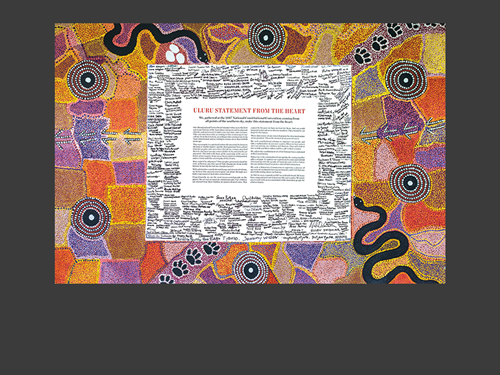
I really think it is important to hear the voices of indigenous Australians (although they number approximately 860,000 people in 2020) and support their causes as many of the causes also affect us. I follow many of the causes of indigenous people today especially when it comes to indigenous health, indigenous crime and environmental issues and land use. Many elders such as Bunna Lawrie (a Mirning elder from the Great Australian Bight area of South Australia) has been fighting to keep oil and gas drilling out of the Great Australian Bight to maintain marine parks. Cases like these showcase the need for education of indigenous people is critical to help their fight from private enterprise and finding ways to embrace renewables.
Which now brings me back to today’s Gospel reading of Mark. Rick Morley, Episcopal Priest of New Jersey summed up Mark 6:14-29 succinctly but I see its relevance for NAIDOC week.
The Gospel of Mark is a very short account of the life and times of Jesus. It does not mention the birth of Jesus or does it even have resurrection accounts. But it does mention an extended section of the relationship between Herod and John the Baptist. So why do we have this detailed account of Herod’s marital situation and this birthday party? Why? I really like Pastor Morley’s explanation.
If you re-read Mark, it is a short telling of the Gospel of Jesus written for a people scared and persecuted. Jerusalem had either just fallen, or was about to, and Mark’s people were frightened beyond words. People were saying all kinds of things about Christians – things that were blatantly untrue – and horrific things were going on to people they knew and loved.
There is always the danger in religious circles to think that if you’re on God’s Team then everything will be great. You’ll be healthy, wealthy, and wise. God will heal every disease and conquer every foe.
Well…not if you’re John the Baptist. If you’re John you’ll be the victim of an immature girl and an impotent puppet ruler, and your head will be served on a platter. This story is a bit of a downer. But, more than that, it’s a shot of sobering reality.
Even the very best of us can be victim to the very worst, and sometimes even to the very worst in other people. And that’s a message those in the first century, and us in the twenty-first century can relate to all too well. But, those fates aren’t what define us. For even though we suffer and are cut down, we are still God’s.
If we look around us today, in this COVID ravaged world, there are God’s people doing amazing things for the poor, the sick, refugees and those who fight on the frontline in healthcare all over the world. If “perfect” lives are the outward mark of blessedness, then this is a God-forsaken place.
But, it isn’t. These are amazing people – faithful people. And God is here. God has been here, and I’d venture to say that God will be here for a very long time.
This is important: what sets us as people of faith apart, isn’t our “perfect” lives, but the Presence of God with us on the best of days and the worst of days. Even when the best of us are served on silver platters.
I like the linkage of the Gospel message to NAIDOC week, as there are so many indigenous people making a difference to this country whether it’s creating awareness and truth telling, those proving themselves in the global sporting arena to those in the fight for a First Nations voice to the Australian Constitution. Fighting for social justice is a great cause and for Christians this has to be central to being human, to being followers of Christ and to follow the Commandments. For John the Baptist, his fight was never forlorn and he only pointed the way to Jesus, the way our lives are also to be led.
AMEN.
Let us pray! On this last day of NAIDOC week, let us remember our First Nations people, their culture, languages and traditions which is intimately tied to their land and country and the numerous learnings of their traditions and its applications today. Let us all thank God for the diversity of people and cultures that make up Australia today.
Offering and Dedication
The offering will be used for the congregation’s continuing mission and ministry including young people and youth ministry in these changing times. Please make your offering through a Bank Deposit or a personal cheque whichever is convenient to you.
Account Name: Boronia Park Uniting Church
BSB: 634-634
Account: 100023784
Reference: Offering
Please contact Robyn Harvey, Treasurer on 0418 783 290 or robyn.49@bigpond.net.au for more information about how to make Direct Debit.
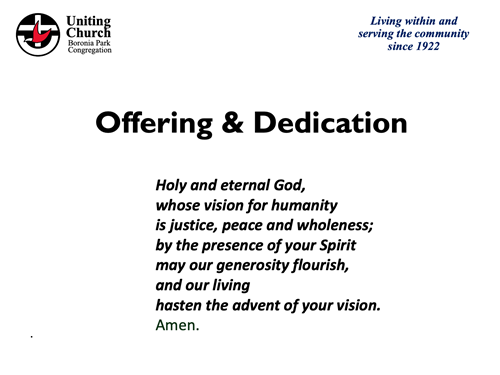
Prayers of the People
Justin Han
Lord's Prayer
Our Father in heaven, hallowed be your name,
我們在天上的父, 願人都尊祢的名為聖,
하늘에 계신 우리 아버지, 아버지의 이름을 거룩하게 하시며,
your kingdom come, your will be done, on earth as in heaven.
願祢的國降臨, 願祢的旨意行在地上, 如同行在天上.
아버지의 나라가 오게 하시며, 아버지의 뜻이 하늘에서와 같이 땅에서도 이루어지게 하소서.
Give us today our daily bread.
我們日用的飲食 今日賜給我們,
오늘 우리에게 일용할 양식을 주시고,
Forgive us our sins, as we forgive those who sin against us.
免我們的債 如同我們免了人的債
우리가 우리에게 잘못한 사람을 용서하여 준 것같이 우리 죄를 용서하여 주시고,
Save us from the time of trial and deliver us from evil.
不叫我們遇見試探, 救我們脫離兇惡,
우리를 시험에 빠지지 않게 하시고 악에서 구하소서.
For the kingdom, the power, and the glory are yours now and for ever.
因為國度, 權柄, 榮耀, 全是祢的, 直到永遠.
나라와 권능과 영광이 영원히 아버지의 것입니다.
Amen.
Hymn Singing
Guide Me O Thou Great Redeemer
Blessing and Dismissal
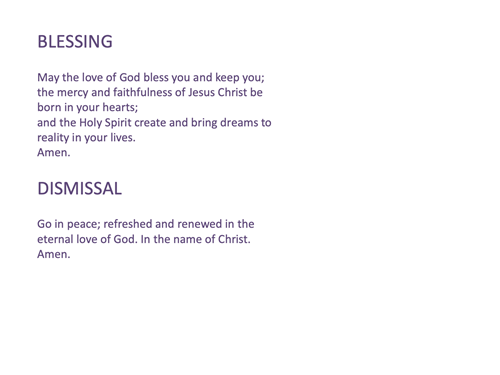
Uluru Statement from the Heart
We, gathered at the 2017 National Constitutional Convention, coming from all points of the southern sky, make this statement from the heart:
Our Aboriginal and Torres Strait Islander tribes were the first sovereign Nations of the Australian continent and its adjacent islands, and possessed it under our own laws and customs. This our ancestors did, according to the reckoning of our culture, from the Creation, according to the common law from ‘time immemorial’, and according to science more than 60,000 years ago.
This sovereignty is a spiritual notion: the ancestral tie between the land, or ‘mother nature’, and the Aboriginal and Torres Strait Islander peoples who were born therefrom, remain attached thereto, and must one day return thither to be united with our ancestors. This link is the basis of the ownership of the soil, or better, of sovereignty. It has never been ceded or extinguished, and co-exists with the sovereignty of the Crown.
How could it be otherwise? That peoples possessed a land for sixty millennia and this sacred link disappears from world history in merely the last two hundred years?
With substantive constitutional change and structural reform, we believe this ancient sovereignty can shine through as a fuller expression of Australia’s nationhood.
Proportionally, we are the most incarcerated people on the planet. We are not an innately criminal people. Our children are aliened from their families at unprecedented rates. This cannot be because we have no love for them. And our youth languish in detention in obscene numbers. They should be our hope for the future.
These dimensions of our crisis tell plainly the structural nature of our problem. This is the torment of our powerlessness.
We seek constitutional reforms to empower our people and take a rightful place in our own country. When we have power over our destiny our children will flourish. They will walk in two worlds and their culture will be a gift to their country.
We call for the establishment of a First Nations Voice enshrined in the Constitution.
Makarrata is the culmination of our agenda: the coming together after a struggle. It captures our aspirations for a fair and truthful relationship with the people of Australia and a better future for our children based on justice and self-determination.
We seek a Makarrata Commission to supervise a process of agreement-making between governments and First Nations and truth-telling about our history.
In 1967 we were counted, in 2017 we seek to be heard. We leave base camp and start our trek across this vast country. We invite you to walk with us in a movement of the Australian people for a better future.